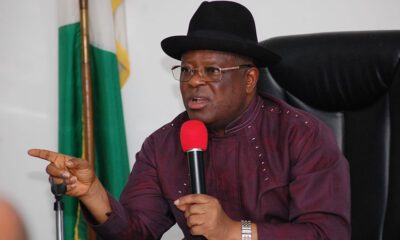Business
NEITI report reveals 23.56% increase in FAAC allocation to FG, State, LGAs

According to a report presented by the Executive Secretary of the Nigeria Extractive Industries Transparency Initiative (NEITI), Dr. Ogbonnaya Orji, the Federal Accounts Allocation Committee (FAAC) disbursed a total of N10.14 trillion to the federal government, 36 states, and 774 local government areas (LGAs) in 2023.
The FAAC Quarterly Review aims to enhance public understanding of the allocation and disbursement processes of the Federation Account, fostering accountability in managing public finances.
The report highlights that the federal government received N3.99 trillion, representing 39.37 percent of the total share. Meanwhile, the 36 states received N3.585 trillion (35.34 percent), and the 774 LGAs received N2.56 trillion (25.28 percent).
Dr. Orji emphasised that the N10.143 trillion disbursed in 2023 marked a significant increase of N1.934 trillion or 23.56 percent compared to the N8.209 trillion disbursed in 2022. This surge in allocation underscores the importance of transparent reporting and accountability in Nigeria’s fiscal management system.
He stated, “A further analysis of the N10.143 trillion disbursements in 2023 showed an increase of N1.934 trillion or 23.56 per cent when compared to the disbursement of N8.209 trillion shared in 2022.
“The review attributed the increase to improved revenue remittances to the Federation Account due to the removal of petrol subsidy and the floating of the exchange rate by the new administration.
“The report highlighted that while total revenues distributed from the account recorded an increase of 23.56 per cent in 2023, the increase accruing to each tier of government varied due to the type of the revenue streams contributing to the inflows into the Federation Account.”
…Increase according to states
The administrative head of NEITI disclosed that the 2023 FAAC allocations analysis showed a cumulative increase of N1.934 trillion received by the federal, state, and local governments compared to 2022.
In the first quarter of 2023, there was a rise of N579.71 billion 33.19 percent over the same period in 2022. The subsequent quarters also saw increases of 10.32 percent, 27.49 percent, and 23.42 percent, respectively.
Orji also mentioned that among the states, Delta State received the highest allocation, amounting to N402.26 billion (gross), with Rivers State following closely at N398.53 billion. He noted that these figures include the states’ earnings from oil and gas derivation revenue.
Business
Cost of healthy diet stood at N982 in March – NBS


The National Average Cost of a Healthy Diet (CoHD) per adult a day stood at N982 in March 2024, the National Bureau of Statistics (NBS) has said.
The NBS said this in its CoHD report for March 2024 released on Tuesday in Abuja.
The bureau said the CoHD in March increased by 4.7 percent compared to the N938 recorded in February.
The NBS said the CoHD was the least expensive combination of locally available items that met globally consistent food-based dietary guidelines.
It said it was used as a measure of physical and economic access to healthy diets.
“This is a lower bound (or floor) of the cost per adult per day excluding the cost of transportation and meal preparation.”
The bureau said that to compute the CoHD indicator, the following data on Retail Food Prices, Food Composition Data, and Healthy Diet Standard were required.
The NBS also said that in March, the average CoHD was highest in the South-West at N1,198 per adult per day, followed by the South-East at N1,140 per day.
It said the lowest average CoHD was recorded in the North-West at N787 per adult per day.
The NBS further said that at the state level, Ekiti, Lagos, and Abia recorded the highest CoHD at N1330, N1249, and N1215.
The bureau said Katsina recorded the lowest CoHD at N739, followed by Sokoto and Zamfara at N758 and N766.
The NBS said CoHD had steadily increased since the first CoHD report by the bureau in October 2023.
“The CoHD in March 2024 is 40 per cent higher than what was recorded in October 2023 at N703 and five per cent higher than CoHD in February 2024, which was N938.
“The food groups that have driven the increases in CoHD the most are vegetables, starchy staples, and fruits. The cost of meeting the recommendations for oil and fats have changed the least.”
According to the report, animal-source foods are the most expensive food group recommendation to meet in March, accounting for 37 percent of the total CoHD to provide 13 per cent of the total calories.It noted that fruits and vegetables were the most expensive food groups in terms of price per calorie.
“They accounted for 12 percent and 14 percent, respectively of the total CoHD while providing only seven per cent and five per cent of total calories in the Healthy Diet Basket.
“Legumes, nuts and seeds were the least-expensive food group on average at six per cent of the total cost.”
The report also said that in recent months, the CoHD had risen faster than general inflation and food inflation.
“However, the CoHD and the food Consumer Price Index (CPI) are not directly comparable.
“The CoHD includes fewer items and is measured in Naira per day, while the food CPI is a weighted index.
“The food CPI increased approximately by four per cent between January and February, while CoHD increased by nine per cent.”
The NBS said the policy implications of these results would foster collaboration among a wide range of stakeholders, such as policymakers, researchers and civil society actors that focus on food security.
“These stakeholders will devise strategies that tackle access, availability, and affordability of healthy diet effectively.
“Also, future research incorporating income can also be used to determine the proportion and number of the population that are unable to afford a healthy diet,” the report said.
Business
Seplat Energy achieves 2.3 million hours without LTI in Q1 2024


Seplat Energy PLC has disclosed that it achieved more than 2.3 million hours without Lost Time Injury (LTI) at Seplat-operated assets in Q1 2024.
This was disclosed in the energy company’s unaudited results for the three months ended 31 March 2024.
For the period under review, production averaged 49,258 barrels of oil equivalent per day (boepd), down 4.8 percent on prior period (3M 2023: 51,720 boepd), but 5.7 percent above Q4 2023 production, and towards the upper end of 2024 guidance (44,000 boepd – 52,000 boepd).
The Company also applauded the progressive moves taken by President Bola Tinubu and the industry regulators, following the signing of the executive orders that will provide fiscal incentives in Nigeria’s gas and midstream businesses. In addition, an executive order was signed and gazetted into law, which has the potential to materially improve our contracting process and bring the right level of efficiency that will support cost reductions. This can drive the much-needed efficiency gains across our industry.
The Nigerian Midstream and Downstream Petroleum Regulatory Authority (NMDPRA) recently lifted the domestic gas price to $2.42/Mscf supporting revenue generation and re-emphasising the government’s commitment to develop Nigeria’s gas resources, a factor aligned with Pillar 2 in our strategy.
According to Seplat Energy, the message to investors on the acquisition of ExxonMobil’s share capital in Mobil Producing Nigeria Unlimited (MPNU) is unchanged. Dialogue between key parties is active and constructive, and the company remains confident that a conclusion will be reached on the transformational acquisition.
Commenting on the results, Chief Executive Officer, Seplat Energy Plc, Roger Brown said, “Seplat Energy continued its trend of strong operational performance in the first quarter. Oil production on OMLs 4, 38, 40 and 41 outperformed expectations, benefiting from low pipeline losses and deferments, which were ahead of plan. Cash flow was down in the first quarter, but this is largely due to the timing difference of lifting oil from the terminals. The business remains strong, production is firmly on track this year and price realisations remain supportive of cash generation.
“In our FY 2023 results we outlined several growth opportunities for 2024. The first of these to start generating revenue for Seplat is Sibiri, which came on stream just a few weeks after the FDP approval was received from NUPRC. At Abiala (a marginal field within OML 40), the drilling programme is on track to start during 2Q. We were delighted to see resumption of operations on the Trans Niger Pipeline in April, approximately four months ahead of plan. Access to the pipeline will enable us to increase production from OML53, as well as providing the primary export route for condensate from AGPC, which remains on track for first gas in 3Q 2024.
“Looking further forward, we are pleased to share that we discovered hydrocarbons in deeper reservoirs than had previously been tested at Sapele-37 and Okhorpuru-9. The initial results are promising, again highlighting the world class quality of the geology in Nigeria.
“In Nigeria, we were pleased to see more progressive actions taken by President Tinubu and the industry regulators. In March, the President signed executive orders that will provide fiscal incentives in our gas and midstream businesses. In addition, an executive order was signed and gazetted into law, which has the potential to materially improve our contracting process and bring the right level of efficiency that will support cost reductions. We applaud the change, which can drive much needed efficiency gains across our industry. More recently NMDPRA lifted the domestic gas price to $2.42/Mscf supporting revenue generation and re-emphasising the government’s commitment to develop Nigeria’s gas resources, a factor aligned with Pillar 2 in our strategy.
“Our message to investors on MPNU is unchanged. Dialogue between key parties is active and constructive, and we remain confident that we can reach a conclusion on this transformational acquisition,” he said.
Business
FG requires $10bn to revive power sector


The Minister of Power, Mr Adebayo Adelabu says the Federal Government requires $10 billion investment yearly, to revive the power sector for the next 10 years.
Adelabu said this in Abuja on Monday, at a one day investigative hearing on halting the electricity tariff increase by the Nigerian Electricity Regulatory Commission (NERC) organised by the Senate Committee on Power.
“For this sector to be revived, the government needs to spend nothing less than 10 billion dollars annually in the next 10 years.
“This is because of the Infrastructure requirement for the stability of the sector, but the government cannot afford that.
“And so we must make this sector attractive to investors and to lenders.
“So for us to attract investors,and investment, we must make the sector attractive, and the only way it can be made attractive is that there must be commercial pricing,” he said.
Adelabu added, “If the value is still at N66 and the government is not paying subsidy ,the investors will not come.
“But now that we have increased the tariff for a Band, there is interest being shown by investors.”
The Minister said the major challenge in the sector was absence of liquidity, saying that the sector had been operating on a subsidised tariff regime, given the absence of a cost reflective tariff.
He said that the subsidy had not been funded over the years as huge liabilities were owed to the Generating Companies (GenCos) and the Gas Companies.
Adelabu said the inability of the government to pay the outstanding N2.9 trillion subsidy was due to limited resources, hence the need to evolve measures to sustain the sector.
He appealed to the lawmakers to support the process of paying the debt owed operators across the value chain of generation, transmission and distribution.
“The increase is based on supply, saying that any customer that does not receive 20 hours power supply will not be made to pay the new tariff,” he said.
He said the government was committed to ensuring sustainable reform in the sector, saying that there was a need to clear the outstanding debt owed to GenCos and Gas companies.
To improve power supply, he said the government was investing in hydro electric power, adding that construction of 700 mega watt power in Zungeru had commenced, while Kashimbila Hydroelectric power plant of 40 megawatt was awaiting evacuation to improve generation.
The Minister said there was also an ongoing investment of 26 small hydro power dams to boost electricity production across the country.
However, members of the committee in their separate remarks decried the experiences of Nigerians on electricity supply over the years, despite the unbundling of the sector.
Sen. Lola Ashiru, the Vice-Chairman of the committee said Nigerians were paying for inefficiency of power sector operators.
Ashiru said there was a lot of inefficiency across the value chain of generation, transmission and distribution..
He said poor Nigerians must be protected, adding that there was a need to consider a reversal of the tariff increase.
Sen. Solomon Larlong said there was no consultation before the increase, adding that issues of palliative should have been discussed and provided before the tariff increase.
The Chairman of the Committee, Sen. Enyinnaya Abaribe, said what Nigerians wanted was a solution to the issues and ways to ensure liquidity in the sector.
He also decried the non appearance of a company “ZIGLAKS” over the failed agreement to provide prepaid meters for Nigerians.
He alleged that the company had received N32 billion in 20 years to meter Nigerian electricity consumers.
Sen. Adamu Alero said due consultation was not made before the tariff increase.
He said the public was not at peace with the increase, saying that the increase was over 200 per cent, hence the need for a reversal of the tariff increase.
-
capital market2 years ago
Rt.briscoe, FBNH, Others halts negative performance of stock market
-
Finance3 months ago
Court orders Sen. Victor Umeh to repay N136m bank debt to AMCON
-



 Abuja Update2 months ago
Abuja Update2 months agoUNDP, FG partnership needed to achieve inclusion, equity- Minister
-
Abuja Update1 month ago
Banks drive stock market performance with N147bn gain
-



 Business1 week ago
Business1 week agoTingo Group unveils Tingo Electric, Tingo Cola drink at Lagos launch
-



 Health2 weeks ago
Health2 weeks agoCapacity training will reduce migration of health workers- NPHCDA
-
News4 months ago
Oil thieves sponsoring malicious media campaign against Navy – Spokesman
-



 Infotech1 month ago
Infotech1 month agoWorld Backup Day: NITDA urges Nigerians to ensure backup of data
















